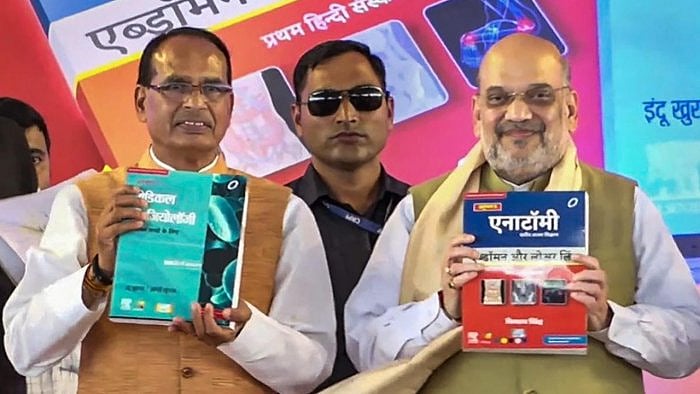
Union Home Minister Amit Shah and agriculture Minister Shivraj Singh Chouhan during the release of the Hindi books for the first year of medical courses.
Credit: PTI File Photo
The Narendra Modi government has, from the beginning, followed a language policy that accords supremacy to Hindi and has persisted with it. It is becoming more blatant and aggressive about the use of Hindi and is expanding its usage to more domains. All central government organisations and institutions are promoting Hindi and the government has pushed state governments to increase its use. John Brittas, an MP from Kerala, recently protested against a minister who gave him a reply in Hindi to a question in English. Sansad TV will broadcast Rajya Sabha proceedings only in Hindi now, even when a member speaks in English. The government has used Hindi and Sanskrit names for new legislations. All the three new criminal laws have Sanskrit names. Last week, it introduced in parliament the Bharatiya Vayuyan Vidheyak, a bill on aviation. Many names and designations in Hindi sound strange to non-Hindi speakers.
The obsession with Hindi goes against the idea of a federal polity. Federalism is not just a political idea about rights and powers to the states that make them sovereign in their respective geographies. It is also a cultural idea that respects the identity and self-image of the states in terms of language and other attributes. This form of Hindi promotion also violates the Constitution. Article 348 (1)(b) prescribes that all authoritative texts of legislation must be in English. That includes bills and amendments, Acts passed by parliament or a state legislature, Central and state ordinances, and rules relating to laws. Article 348 (1) prescribes that the language of the Supreme Court and the high courts should be English. These are specific mandates and they should be followed by the government.
The BJP has tried to link Hindu and Hindi, but Hinduism has nothing to do with Hindi. Hindi is not the language of Hinduism just as Urdu is not one of Islam. No religion is linked to a language, and India as a country is not linked to any particular language. Most Indians and Hindus do not speak Hindi and converse in a variety of other languages – the country has 22 officially recognised languages, and many others which are spoken by millions of people. They are mother tongues to the people, languages to which they are emotionally bound, and which define their identity. The increasing use of Hindi in government business and communication will be resisted by speakers of those languages and governments of non-Hindi-speaking states because it is seen as an attempt to make Hindi dominate other languages. Languages are also colonial tools
and often come in political packages. The government will be unwise to ignore the widespread opposition to its Hindi campaign and should halt it in the interest of national unity.
